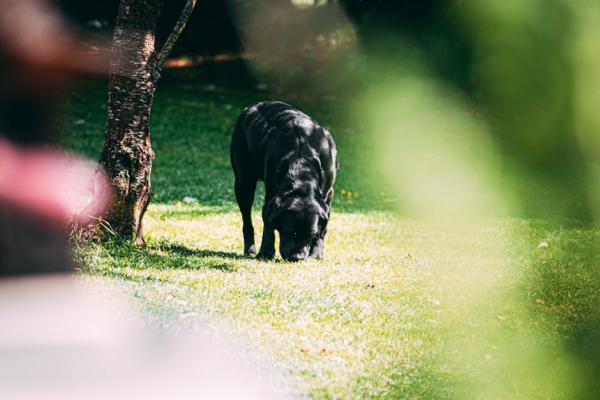Can Dogs Smell My Fear?



See files for Dogs
Have you ever felt a shiver down your spine when approaching an unfamiliar dog, only to have it react nervously too? It might not be a coincidence. We all known that dogs possess a remarkable sense of smell, thousands of times more acute than ours. What if they could also sniff out something as intangible as human emotions, specifically fear?
In this AnimalWised article, we explore the question if dogs can smell fear in humans, as well as the science behind how dogs perceive human emotions. We'll also discuss what this means for your interactions with dogs and offer tips on navigating situations where fear might arise.
How powerful is a dog's sense of smell?
Compared to humans, dogs have a significantly more acute sense of smell. This is due to two key factors:
- Dogs possess a far greater number of olfactory receptors in their nasal cavities. Estimates suggest they have between 100 million and 300 million receptors, compared to just 6 million in humans.
- The portion of a dog's brain dedicated to analyzing scents is proportionally much larger than ours. It's estimated to be 40 times greater.
This combination allows dogs to detect odors thousands, even hundreds of thousands, times fainter than humans can. This superior sense of smell plays a crucial role in many canine behaviors, including tracking, searching for objects, and potentially even detecting human emotions.
What is considered fear?
Fear is a fundamental human emotion triggered by the perception of danger or threat. This threat can be physical, such as encountering a predator, or psychological, like the fear of public speaking. Fear serves an important evolutionary purpose, prompting us to take action to avoid harm or escape a threatening situation.
Fear triggers a cascade of physiological changes. The amygdala, a part of the brain responsible for processing emotions, initiates the fight-or-flight response. This results in increased heart rate, blood pressure, breathing, and muscle tension, preparing the body for action. The body releases hormones like adrenaline and cortisol, which mobilize stored glucose (sugar) for energy. Additionally, fear can manifest as emotional responses like anxiety, dread, and a sense of impending doom.
While the physiological changes listed above are not directly scent-related, they can indirectly influence body odor. Increased sweating can alter a person's overall scent profile.
Fear also has a cognitive component. Our thoughts and past experiences influence how we perceive and respond to potential threats. For example, a person who has been attacked by a dog may experience intense fear around all dogs, even friendly ones.
Fear can be expressed both verbally and nonverbally. Common verbal expressions include shouting, whimpering, or crying. Nonverbal cues like facial expressions (wide eyes, furrowed brow), body posture (crouching, flinching), and sweating can also signal fear.

Can dogs smell fear?
Many people believe dogs can sense human emotions, particularly fear. While the idea has been around for a while, recent research has shed light on this intriguing possibility.
Recent studies 1 investigated whether dogs could detect human emotions based on scent. The results were intriguing. When exposed to "happy odors," the dogs interacted more with the stranger and exhibited lower heart rates. Conversely, exposure to "fear odors" triggered stress behaviors and elevated heart rates in the dogs, consistent with the fight-or-flight response. Additionally, the dogs sought more comfort from their owners and displayed less interest in the stranger compared to the "happy odor" group.
These findings suggest that chemical signals (chemosignals) emitted by humans during different emotional states can be perceived by dogs. This implies that dogs might not only smell fear, but also potentially adjust their behavior accordingly. However, it's important to note that this research focused on specific breeds and emotions. Further studies are needed to explore the full scope of a dog's ability to detect human emotions through scent.
What about body language?
While dogs have a remarkable sense of smell, their ability to read human body language is equally impressive. They can pick up on subtle cues of fear, like tense posture or averted eyes, which might even be their primary way of detecting our apprehension.
Not all fear is one-sided! Learn how to calm a nervous dog in our next article.

What should I do if I am scared of dog?
If a dog smells fear from a person, it might misinterpret the scent as a sign of aggression or danger. This could trigger a defensive reaction from the dog, such as barking, growling, or even lunging.
It is important to note that a well-socialized and confident dog is less likely to react negatively to someone smelling fearful. However, a nervous or anxious dog might be more easily spooked by the scent of fear.
Even if a dog smells fear, its overall reaction will likely be influenced more by the person's body language. If the person appears tense, avoids eye contact, or makes sudden movements, the dog might perceive a threat even if the person is simply afraid.
How to not show fear around dogs
- Stay calm and avoid erratic movements. Move slowly and deliberately.
- Maintain a neutral posture, like standing tall with relaxed shoulders, and avoid hunching over.
- Don't make direct eye contact. While staring is considered rude in dog language, a relaxed side glance shows you're not a threat.
- Don't crowd the dog or reach out to pet it without permission.
- If you feel threatened, seek help from the dog's owner. Let them know you're uncomfortable and ask them to remove the dog from the situation.
Need help socializing your adult dog? Our next article offers tips and tricks.

If you want to read similar articles to Can Dogs Smell My Fear?, we recommend you visit our Facts about the animal kingdom category.
1. https://www.researchgate.net/publication/320265642_Interspecies_transmission_of_emotional_information_via_chemosignals_from_humans_to_dogs_Canis_lupus_familiaris








